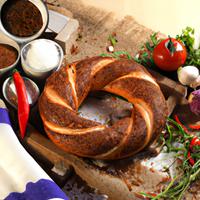
1 serving (100 grams) contains 290 calories, 9.0 grams of protein, 6.0 grams of fat, and 55.0 grams of carbohydrates.

Log this food in SnapCalorie

Nutrition Information
Calories |
725 | ||
|---|---|---|---|
% Daily Value* |
|||
| Total Fat | 15 g | 19% | |
| Saturated Fat | 2.5 g | 12% | |
| Polyunsaturated Fat | 0 g | ||
| Cholesterol | 0 mg | 0% | |
| Sodium | 1000 mg | 43% | |
| Total Carbohydrates | 137.5 g | 50% | |
| Dietary Fiber | 5 g | 17% | |
| Sugars | 7.5 g | ||
| protein | 22.5 g | 45% | |
| Vitamin D | 0 mcg | 0% | |
| Calcium | 50 mg | 3% | |
| Iron | 5 mg | 27% | |
| Potassium | 250 mg | 5% | |
* Percent Daily Values are based on a 2,000 calorie diet. Your daily values may be higher or lower depending on your calorie needs.
Food Attributes
Source of Calories
About Turkish bagel
Turkish bagels, known as "simit," are a popular street food staple in Turkish cuisine, beloved for their crisp exterior and soft, chewy interior. They are typically circular and coated in sesame seeds, which lend a nutty flavor and crunchy texture. Simit is made from a simple dough consisting of flour, water, yeast, and a touch of sugar or salt, and it gets its distinctive crust from a water-and-molasses dip before baking. As a bread product, simit is a source of carbohydrates, providing quick energy, and the sesame seeds contribute healthy fats, plant-based protein, and essential minerals like calcium and magnesium. However, due to its carbohydrate-rich nature, simit should be enjoyed in moderation, particularly in balanced diets. Often paired with tea, cheese, or fresh vegetables, simit offers an authentic taste of Turkish culinary culture and is a delightful option for breakfast or snack time.



